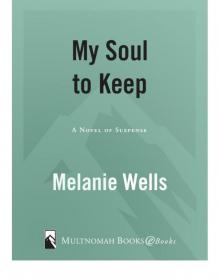- Home
- Melanie Wells
The Soul Hunter
The Soul Hunter Read online
PRAISE FOR MELANIE WELLS’S BOOKS
The Soul Hunter
“A bloody ax, a tragic victim, a persistent demon, a haunted killer, a broken heart—all this and a bunny rabbit, too? The master of supernatural mystery, Melanie Wells, delivers big time in The Soul Hunter. A dash of romance and a generous serving of humor, seasoned with grace, makes this a thriller not to be missed.”
KATHRYN MACKEL, AUTHOR OF THE HIDDEN
“In The Soul Hunter, Melanie Wells demonstrates again her talent as a storyteller. Her lovably neurotic and intrepid narrator, Dr. Dylan Foster, is back, haunted once more by demonic Peter Terry, and terrified not only by the presence of a bloody ax on her doorstep but also by an invasion of rats in her home and an upcoming tenure review. Part mystery thriller, part comedy of manners, part novel of moral scrutiny, The Soul Hunter showcases Wells’s gift for spinning an intricate tale filled with an edgy mix of humor, suspense, and spiritual intrigue. I swallowed the novel in one deliciously terrified gulp.”
K. L. COOK, AUTHOR OF LAST CALL AND THE GIRL FROM CHARNELLE
“With deft humor and spiritual insight, Melanie Wells is creating one of the most memorable and likable heroines in mystery literature. This is spine-tingling storytelling. It’s edgy: It’s hip. And it’s not to be missed!”
ERIC WILSON, AUTHOR OF EXPIRATION DATE
“Melanie Wells let me to see the world through a woman’s eyes without getting grossed out or crying, “Cooties!” The Dylan Foster character was believable, relatable, and someone cool I’d like to be friends with. The fact that she’s a demon-seeing curious professor who can’t stay out of trouble is charming. It’s great to “ride along” with a down-to-earth Christian who fits into her culture without apologies or overt preaching.”
DOUG VAN PELT, EDITOR OF HM MAGAZINE
When the Day of Evil Comes
“When the Day of Evil Comes is a chilling story, blessedly short enough to be read over a weekend because you’re not going to want to put it down until you’ve finished it.”
PAULA PARKER, LIFEWAY CHRISTIAN RESOURCES
“Melanie Wells has written a powerful first novel.”
DALLAS MORNING NEWS
“When the Day of Evil Comes is a glimpse into the spiritual battle taking place not only for our hearts but also for our minds…a well-crafted novel with a compelling heroine and plot.”
MELANIE DOBSON, FOCUS ON FICTION
For Dwight Huber,
who taught me always to speak my mind
and
For Vickie Kraft,
who taught me that perhaps always is not a good idea
“To us a human is primarily food; our aim is the absorption of its will into ours…. [But] one must face the fact that all the talk about [the Enemy’s] love for men…is not (as one would gladly believe) mere propaganda, but an appalling truth.”
SCREWTAPE TO WORMWOOD IN
THE SCREWTAPE LETTERS BY C.S. LEWIS
Acknowledgments
A magical transformation takes place when your first book gets published. Credibility, as it happens, opens a lot of doors. And waiting on the other side are articulate, accomplished professionals who are happy to help you with your research. Talking to these individuals, digging into their expertise, was the great joy of writing this book.
I’m indebted to the good folks of the Dallas Police Department Crimes Against Persons Division (CAPERS), Homicide Section, who do an impossible job under difficult circumstances, yet manage somehow to retain their decency and their humanity. Any authenticity in this story is theirs. Deliberate inaccuracies (the DPD does not keep prisoners handcuffed or chained during interrogation, for instance) are mine, kept for the sake of the story. Detectives Robert Quirk and Phil Harding, two of the finest and hardest working people I know, let me follow them around and made themselves available for all of my questions. Detective Dan Krieter gave me a fascinating explanation of fingerprint technology and helped me work out crucial details regarding physical evidence. Sergeant Eugene Reyes was generous in offering me access to his squad. And Gerry Meier, Senior District Judge, Dallas County (retired), who served as my entrée to the DPD, shared a pot of tea with me and helped me construct a criminal history for Gordon Pryne.
I’m grateful to Bruce Feldman for help with the Hebrew. And to my former colleague, Bob Pyne, Professor of Systematic Theology at Dallas Theological Seminary, for his help with theology, and for lending me a stack of his books for the better part of a year.
Pamela Lindsay Feagins, M.D., pitched in on medical issues, as did Drs. David Missimo and Bryan Forsythe. And a big thanks to Beverly Crittendon, the only female used car dealer in Dallas, for letting me use her car lot.
At Multnomah, Kevin Marks, fiction group publisher, and Sharon Znachko, group marketer for fiction, have been incredibly supportive, as have the rest of the folks up there in Sisters. And James Hall, the Multnomah artist who designed the cover for this book and for When the Day of Evil Comes, managed to capture the eerie character of both novels in a way that compels people to pick them up off the stack and take them home.
Rod Morris, my editor at Multnomah, waited patiently while I finished the draft—several months after deadline—and then managed, with his customary sharp eye, deft ear, and infallible tact, to excavate just the right words from the pile. What a pleasure to work with an editor who respects the writer’s voice, yet knows exactly when to tone it down (by cutting the parentheticals, primarily).
Lisa Taylor, my publicist, is intrepid in her pursuit of reviews, interviews, press mentions, and speaking opportunities. My agent, Don Pape of Alive Communications, is a godsend, in the truest sense of the word. I’m humbled by his faith in me and grateful for his persistence on my behalf and his unflagging regard for my work.
Trish Murphy takes the solitude out of writing for me. I wrote much of this book parked at her kitchen table with my laptop while she tweaked song lyrics and made the tuna casserole. Dennis Ippolito read the manuscript several times, asking questions, offering suggestions, and helping me excise the mistakes. His input has been invaluable. And Trish and Dennis both, champs that they are, sat around a swimming pool in Phoenix with me one hot weekend in September and read the entire manuscript out loud, laughing at all the right moments and helping me with nuances of tone, rhythm, plot, and dialogue.
Thanks to Elizabeth Emerson, Kim Coffin, and Christine Carberry, who combed the final draft for errors and picked them out, one by one.
A special thanks to the staff at LifeWorks, who fill in the gaps when I’m buried in book-related tasks. And to the Waah Waah Sisterhood for keeping me sane. Much love to Dot, Ron, Mike, Alissa, and Chance.
It takes a village to produce a novel. To those wonderful individuals who helped with this one, I offer my deepest thanks.
1
You’d think I’d have learned my lessons by now. Some people, it turns out, are not what they seem. Some secrets, it turns out, are better left untold. And some specters, it turns out, are better left unseen. And the answers, it turns out, don’t always arrive in order. And when they do show up, they just might kick open a door you’re better off leaving closed up tight.
I thought I’d gotten all the education I needed a year or so ago, starting with an innocuous decision I’d made to go to a cold spring pool on a hot summer day. I’d found myself standing in the gaze of the red-hot eyes of hell and discovered, quite by accident, that I’d caught the attention of the universe somehow. But not the kind of attention you want, if you get my meaning.
I’d looked evil in the eye that day and faced it down in the weeks that followed, more out of necessity than anything else. It certainly had nothing to do with bravery or spirituality or any quixotic sense of adventure I might have had.
I’d just found myself in the target zone, so I’d fought when I had to, ducked when I could, and run when I couldn’t think of anything else to do. And I’d eventually gotten out of the whole mess with a good-sized dose of grit, some help from the Almighty, and a couple of trips to Chicago.
It began this time, as some of my least intelligent moments do, in front of the mirror. It was the eve of my thirty-fifth birthday and I was feeling the need for self-examination, I suppose. Some misguided ritual to mark the passageway to the other side of my thirties.
Magnifying mirrors were invented by Satan, I’m convinced. No human I’ve ever known could spend any time at all in front of a magnifying mirror examining pores and eyebrow hairs without coming away from there with a toxic sense of shame and self-doubt.
On this occasion, I committed the additional catastrophic error of looking at myself from behind. In a department store dressing room. Under fluorescent lights. While trying on bikinis. In winter.
To my dismay, stuck right there on the back of my formerly firm legs were my mother’s thighs. My mother’s Texas milkmaid thighs.
I work hard to stay in shape. Though I am an academic, and most of the professors I know are thoroughly slovenly in their personal habits, I have resolutely risen above the fray. I am non-lumpy. I have fitness goals. I have completed a triathlon.
And I absolutely refuse to let my rear end slide south toward my ankles.
So the dismay I felt at that moment under the lights was genuine. I could not have been more surprised.
Now, all women know the steps to combat body-image trauma. Men would do well to memorize the procedure too. This sort of handbook-type information, if utilized correctly, could cut the divorce rate by a third, I’m convinced.
The first step, of course, is to shop. Preferably for expensive fitness gear that will encourage you to work out with renewed vigor and dedication. Or, if you choose to punt on self-improvement, an alternative is to shop for a new and fetching outfit that disguises the body part in question.
I went for the fitness gear. I swim regularly, but those endless laps in the pool were not warding off the impending thigh disaster. Though I have to say, my arms looked pretty smokin’.
The answer here was shoes. I needed running shoes. Now.
The second step is to call a friend, or perhaps an evolved squeeze or spouse, and complain. Qualified and well-trained personnel will assure you that you look like a couple million bucks and that you’re just in the middle of a psychotic break.
Let’s go get double-hot-chocolate lattes, they’ll say.
Which is step three.
Step four is to roll your sad little self out of bed the next morning, strap on your new gear, and get yourself to the gym. Most individuals hit the wall after steps one or three.
I intended to complete the entire process. I was not going down without a fight.
Since I was already at the mall, I abandoned my bikini search and marched myself straight to the sporting goods store, squaring my shoulders against the heady smell of chocolate chip cookies as I passed by Mrs. Fields.
I had momentum. I was feeling good. I was on it.
And then I ran into John Mulvaney.
John Mulvaney is a colleague of mine—a fellow psychology professor at Southern Methodist University. A full citizen in the sometimes moldy and pretentious world of academic clinical psychology. That is the entire extent of our common ground.
That, and the fact that we both believe deeply that he is a genuinely pathetic human being.
We’d crossed paths the year before in a bizarre incident that left me with a strange mix of pity and loathing toward the man. And a powerful urge to avoid him.
In this instance, avoiding him was impossible. I literally bumped right into him.
He was turning away from the cash register at Mrs. Fields, hands loaded with a half dozen greasy warm cookies, a soft drink, and a vanilla milkshake. He had a smear of chocolate on his upper lip.
I pasted on a fake smile. “Hello, John.”
“Dr. Foster,” he said back.
“You can call me Dylan, John.”
“I prefer the title,” he mumbled.
We went through this silly little ritual each time we spoke. He had never once gotten a “Dr. Mulvaney” out of me.
His eyes firmly fixed on the ground, he sucked hard on his milkshake straw, coaxing a thick clot of ice cream into his mouth. He chased it with an enormous bite of cookie.
I watched with raw disgust, fighting the urge to wipe the chocolate off his lip.
“Well,” I said. “Nice seeing you, John. Have a good afternoon.”
I turned to leave. I got a good twenty yards into my escape before he called out after me.
“I’m going shopping,” he said. “I need a sweater.”
I turned and stared at him. Was this merely a social-skills debacle on his part or had he gone insane?
Incredibly, he kept talking.
“And then I’m going to see a movie. The new art film. At the Inwood.”
“Okay, John. Have a good time.”
Why do academics love art films? And why was John Mulvaney telling me about his afternoon plans?
I shot him a little wave and walked away. Rapidly. I made it this time. A clean exit.
I bought myself some nifty high-tech running shoes, after a fairly intriguing ritual of rolling up my jeans and walking barefoot in front of the sales person so she could see what my feet do when I walk. I pronate, apparently.
And then I initiated step two and called my evolved boyfriend.
“David Shykovsky,” he said.
“I hope you know the correct answer to this question.”
“What question is that, Sugar Pea?”
“What do you think of my legs?”
“Ah. Let’s see. Many men would fail this test. But not me.” Darling man.
“The correct answer,” he said, “if I recall from years of answering this sort of question miserably in other, less crucial circumstances with other, less fabulous women, is that your legs, like the rest of you, are perfect. Wonderful. Sublime.”
“Flabby?”
“Absolutely not.”
“Good man.”
“Why?”
“No reason. Want to meet me for a double-hot-chocolate latte?”
“I’m working, babe.”
Rats. So much for step three.
“Funeral today?”
“Nope. Body coming in.”
“I don’t know how you do that job.”
“I don’t know how you do yours either, Professor. At least my patients are mentally stable.”
“Your patients are dead.”
“Exactly. I don’t talk to them. I don’t worry about them. I don’t listen to their problems. I just drain ’em and dress ’em.”
“That’s so gross.”
“I prefer to think of it as a necessary art.”
“How do you figure?”
“You try to make a ninety-seven-year-old dead person with no teeth look like they’re forty years younger and in deep, peaceful repose. It’s not easy.”
“I could see that. Are you still taking me out tonight for a surprise birthday supper?”
“Check.”
“Italian food?”
“Check.”
“White tablecloths?”
“Check.”
“Expensive wine?”
“Midlist, I’d say.”
“Death business been slow?”
“Check.”
“How about six thirty?”
“You’ll be late.”
“Seven?” I said.
“Check. See you at seven thirty.”
“Check.”
We hung up. David Shykovsky is an enigma to me. Delightful man. Smart. Charming. Good-looking. Adores me.
Owns a funeral home in Hillsboro.
I can’t quite get past that last part.
I spent the rest of the afternoon, a rare sunny Saturday
in January, embarking on my new Thigh Recovery Program. Lunges, squats, weights, and a three-mile run. Take that, milkmaid.
I’d be lucky if I could walk the next day.
After my workout, I showered, stared at my thighs some more—I swear they looked better—and then spent a good half hour primping for my dress-up, pre-birthday date with David. All in all, a pretty high-end day for me.
I was smack in mid-primp when I heard something at the front door. It was a knock of sorts. More of a thump, actually. Or a clunk.
I heard a car pulling away from the house. Maybe I’d missed UPS or something. Maybe it was a pre-birthday present!
Twinkling with anticipation, I threw on a robe and scooted to the front door, checking the peephole.
I unlocked the deadbolt and opened the door.
Something slid across the wood and smacked heavily onto the floor of the entryway, catching my baby toe under its end.
I let out a little scream—a mixture of pain and indignation—and looked down to see what had fallen into my house and onto my foot.
It was an ax.
I couldn’t see it clearly against the hardwood, so I reached down and picked it up, then flipped on the light.
My hands were red. Why were my hands red?
I turned the ax over in my hands.
The ax was red. Had it just been painted?
I looked over at the light switch. A handprint was smeared in red on my wall. My handprint.
I squinted at the blade.
There was hair on the blade.
I dropped the ax, my eyes widening as it thwacked heavily to the floor.
I slid to the floor, my back against the wall.
That ax was covered in blood.
And that, of course, was the moment I knew I’d made my first mistake.
2

 The Soul Hunter
The Soul Hunter When the Day of Evil Comes
When the Day of Evil Comes My Soul to Keep
My Soul to Keep